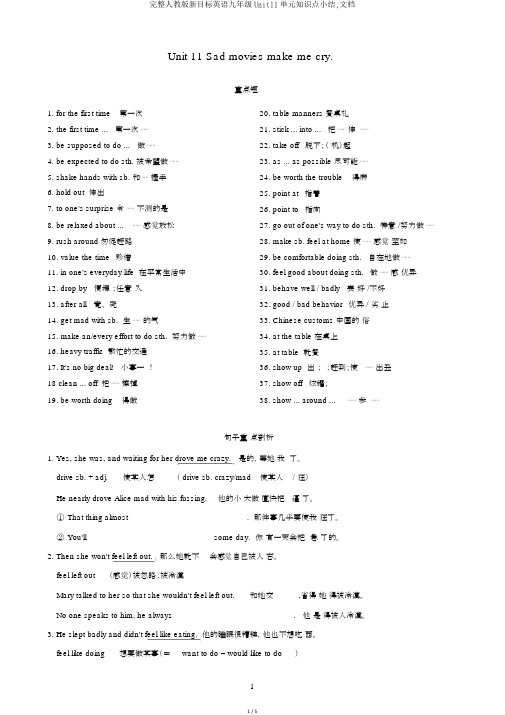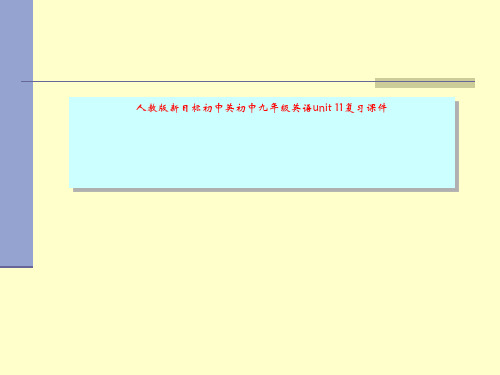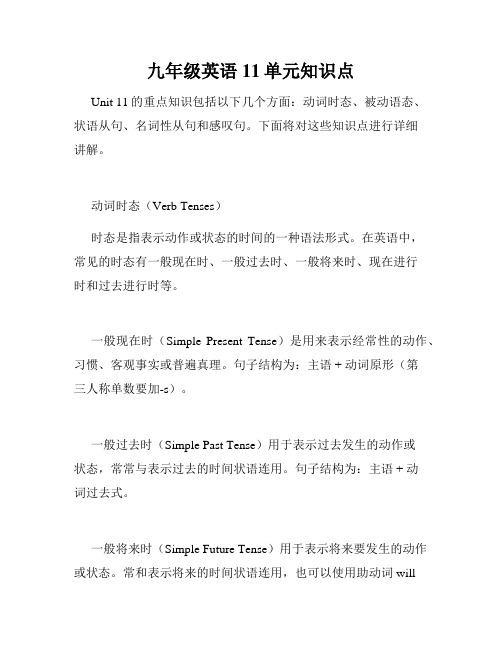人教版新目标九年级全册英语 Unit 11 单元语法知识点考点复习提纲
人教版九年级英语(全一册)Unit11_SectionA_教材重难点知识详解

Unit11 SectionA 教材重难点知识详解SectionA(1a-2d)1. I’d rather go to the Blue Ocean Restaurant because I like to listen to quiet music while I’m eating.would rather do sth.意为“宁可,宁愿”。
e.g. I’d rather play tennis than swim. 比起游泳我宁愿去打台球。
2. Yes, she was, and waiting for her drove me crazy.drive v.迫使drive sb.+adj.,使某人怎样drive sb. crazy/mad 使某人发疯/发狂e.g. That thing almost drive me crazy. 那件事几乎要使我发狂了。
You’ll drive mum mad one of these days.你这样总有一天会把妈妈急疯了的。
3. What happened?happen 发生,不及物动词,常见的用法有(1) “sth.+ha ppen+地点/时间”,“某地/某时发生了某事”e.g. What’s happening outside? 外面发生什么事了?(2) “sth.+happen to+sb.” 意为“某人出了某事(常指不好的事发生在某人身上)”e.g. A car accident happened to him yesterday. 昨天他发生了交通事故。
(3) “sb.+happen+to do sth.” 意为“某人碰巧做某事”e.g. I happened to meet her in the street.我碰巧在街上遇见她。
4. The more I got to know Julie, the more I’ve realized that we have a lot in common.the+比较级+从句,the +比较级+从句“越……, 越……”e.g. The harder you work, the greater progress you will make.你越用功,进步就越大。
完整人教版新目标英语九年级Unit11单元知识点小结,文档

Unit 11 Sad movies make me cry.重点短1. for the first time 第一次20. table manners 餐桌礼2. the first time ... 第一次⋯⋯21. stick ... into ... 把⋯⋯伸⋯⋯3. be supposed to do ... 做⋯⋯22. take off 脱下;(机)起4. be expected to do sth. 被希望做⋯⋯23. as ... as possible 尽可能⋯⋯5. shake hands with sb. 和⋯⋯握手24. be worth the trouble 得麻6. hold out 伸出25. point at 指着7. to one's surprise 令⋯⋯不测的是26. point to 指向8. be relaxed about ... ⋯⋯感觉放松27. go out of one's way to do sth. 特意 /努力做⋯⋯9. rush around 匆促赶路28. make sb. feel at home 使⋯⋯感觉至如10. value the time 珍惜29. be comfortable doing sth. 自在地做⋯⋯11. in one's everyday life 在平常生活中30. feel good about doing sth. 做⋯⋯ 感优异12. drop by 便拜;任意入31. behave well / badly 表好 /不好13. after all 竟、究32. good / bad behavior 优异 /劣止14. get mad with sb. 生⋯⋯的气33. Chinese customs 中国的俗15. make an/every effort to do sth. 努力做⋯⋯34. at the table 在桌上16. heavy traffic 繁忙的交通35. at table 就餐17. It's no big deal! 小事一!36. show up 出;;赶到;使⋯⋯ 出丑18 clean ... off 把⋯⋯擦掉37. show off 炫耀;19. be worth doing 得做38. show ... around ... ⋯⋯ 参⋯⋯句子重点剖析1. Yes, she was, and waiting for her drove me crazy.是的,等她我了。
Unit 11知识提纲人教版新目标英语九年级全册

Unit 11 Section A la-2d 知识提纲(81-82)一、词形转换1.drive v.驾驶,迫使一n. driver 司机te adj.一tely 最近二、短语互译1.would rather 宁愿2. drive sb. crazy/mad 使人发疯 / 发狂3.be friends with sb.成为某人的朋友4. leave out 忽略,不包括5 yes and no是又不是,又不完全是6. have in common有共同点三、词法及句法1.make (made , made )①做, 制造make sth. She can make kites .② 使,使得make sb. do sth. — be made to do sth.make sb. / sth. + adj. The news made him happy .make it + adj. to do sth. Computers make it easier to learn English . 与make相关的短语有:make the bed整理床铺make a plan制定计划make friends with与…交朋友make faces做鬼脸make progress取得进步make a noise 制造噪音make money 赚钱make up 编造2.drive (drove , driven ) v. 驾驶一n・ driverv.迫使drive sb. crazy/ mad 迫使某人发狂/ 发疯drive sb.to do sth.Loud noise drives people crazy . 噪音迫使人发疯。
3.leave (left, left) vi./vt 离开leave for + 地点 "动身去某地"leave +地点for +地点“离开某地去某地”leave sth. +地点状语“把某物遗忘在某地” leave one by oneself把某人单独留下leave out不包括,忽略,不提及4.each / every time每次引导时间状语从句Each time I listen to your advice , I get into trouble .5.the+比较级+句子,the+比较级+句子表示"越……越……” The harderyou study , the better grades you will get.你学习越努力,你的成绩就越好比较级+and+同样比较级“越来越……”more and more beautiful 越来越美6.would rather + do sth .宁愿做某事would rather do sth. than do sth. = would do sth. rather than do sth.=prefer to do sth. rather than do sth. 宁可.... 也不...7.rather than而不是后接名词、代词及动词原形instead of代替,而不是后接名词、代词及动名词。
人教版九年级的英语第十一单元学习的知识点的复习模板计划总结计划.doc

人教版九年级英语第十一单元知识点复习总结Unit 11 Sad movies make me cry一.单词rather would rather drive drive sb crazy/mad the more...the more... lately be friends with sb leave out friendship king power prime minister prime minister banker fame pale queen call in examine nor neither...nor palace wealth to start withlet...down coach kick kick sb off be hard onsb besides teammate courage rather than guy pull pull together relief nod agreement fault disappoint二. 1.rather adv可修饰形容词及它的比较级 a little ; much; a bit ; even; still注意:副词可用来修饰动词;形容词;副词。
2.prefer to do sth rather than do sth=prefer doing sth to(doing) sth=would rather do sth than do sth=would do sth rather than do sthAll students prefer to take the bus rather than walk.=All students prefer taking the bus to walking.=All students would rather take the bus than walk.=All students would take the bus rather than walk.Would rather 用法1)would rather “宁愿;宁可;更喜欢”;后跟动词原形would rather do sth. =prefer to do sth. I would rather stay at home because it’scold outside.否定句: would rather not do sth宁愿不做某事2).一般过去时表示现在或将来的愿望I’d rather you went tomorrow (now).我宁愿你明天(现在)去。
人教版新目标初中英初中九年级英语unit 11复习课件

❖ She wanted to know if I had finished m homework. ❖ 她想要知道我是否已经完成了我的作业。 ❖ Did you know when he would be back? 你知道他将会什
么时候回来?
❖ 2. get v. 得到、买、到达 ❖ 3. make a telephone call 打电话 ❖ 4. save money 省钱、存钱 ❖ 5. ①问路常用的句子:
4. The t________ of this evening party is r________.
5. The young boy's mother often tells him to be a b_________ man.
II.句型转换
1. The Smiths said
they
would
语从句由一般疑问句变化而来时,用if或whether来引导;(2)当主
句时态为一般过去时时,宾语从句须用相对应的过去的某一种时
态。
❖
su3p.peIrd. oIfnt'ht ekyn_o_w_w_if_itlh_le_g_s_otu_;d_e_gn_t_os_________(g_o_)t(hgeor)eto,
us.(二合一) ❖ Miss Gao told us the moon _______ _______ the earth. ❖ 答案为:goes around.月亮绕地球转是一个客观事实,故从句时
态用一般现在时,不受主句时态的影响。 ❖ (2) “I have been to Beijing twice.” He said to us.(二合一) ❖ He _________ us ______ ______ ______ ________ Beijing
九年级英语11单元知识点

九年级英语11单元知识点Unit 11的重点知识包括以下几个方面:动词时态、被动语态、状语从句、名词性从句和感叹句。
下面将对这些知识点进行详细讲解。
动词时态(Verb Tenses)时态是指表示动作或状态的时间的一种语法形式。
在英语中,常见的时态有一般现在时、一般过去时、一般将来时、现在进行时和过去进行时等。
一般现在时(Simple Present Tense)是用来表示经常性的动作、习惯、客观事实或普遍真理。
句子结构为:主语 + 动词原形(第三人称单数要加-s)。
一般过去时(Simple Past Tense)用于表示过去发生的动作或状态,常常与表示过去的时间状语连用。
句子结构为:主语 + 动词过去式。
一般将来时(Simple Future Tense)用于表示将来要发生的动作或状态。
常和表示将来的时间状语连用,也可以使用助动词will或be going to来构成。
句子结构为:主语 + will + 动词原形(be going to + 动词原形)。
现在进行时(Present Continuous Tense)表示现在正在进行的动作或状态。
be动词用于各种人称和数,后接动词的现在分词形式。
句子结构为:主语 + am/is/are + 现在分词。
过去进行时(Past Continuous Tense)用于表示过去某个时间点正在进行的动作或状态。
be动词采用一般过去时态,后接动词的现在分词形式。
句子结构为:主语 + was/were + 现在分词。
被动语态(Passive Voice)被动语态是指动作的承受者变为主语,动作的执行者变为介词短语,并且在be动词后加上动词的过去分词形式。
被动语态的构造:be动词(时态相同) + 过去分词。
状语从句(Adverbial Clauses)状语从句是一个句子,用来修饰或限制主句中的动作或状态。
有时间状语从句、地点状语从句、条件状语从句等。
状语从句用于主句的前后位置,没有固定的顺序。
人教版九年级全册英语第11单元知识点复习提纲
人教版九年级全册英语第11单元知识点复习提纲1.课文原句:I'd rather go to Blue Ocean because I like to listen to quiet music while I'm eating.would rather+动词原形”表示“宁愿做某事”,其否定形式是would rather not do sth.。
would在此无“过去”之意,它是一个情态动词,且无人称和数以及时态的变化。
例:Mr. Li would rather not listen to rock music.李先生宁愿不听摇滚音乐。
“宁愿……而不愿……,与其……宁可……”可用would rather do sth. than do sth.;would do sth. rather than do sth.;prefer doing sth. to doing sth.;prefer to do sth. rather than do sth.注意:would (rather) 和than后都接不带to的动词不定式。
使用would rather… than句型时要注意平行结构,即在than的前后要用两个同类的词或词组,如两个名词、两个不带to的不定式、两个介词短语等。
例:I would rather watch TV at home than go to the cinema. 我宁愿在家看电视也不愿意去电影院看电影。
2.、neither引起的倒装so, neither位于分句或句子的开头,后面用倒装语序时,这种结构通常表示前面所说的情况也适合于另一个人(或事物),表示“某人也(不)……”之类的概念。
其句型可归纳为: So / Neither + be动词 / 助动词 / 情态动词 + 主语。
如:▲-I won't do such a thing. 我可不做这样的事。
-Neither will he. 他也不会。
英语人教版九年级unit11知识点
英语人教版九年级unit11知识点英语人教版九年级Unit 11知识点Unit 11 in the English textbook for ninth graders, published by the People's Education Press, covers various important aspects of the English language. In this unit, students learn about different topics, including future plans, professions, environmental issues, and ways to express opinions. Let's explore some key points from this unit.1. Future Plans:Students are introduced to different ways of expressing future plans in English. They learn about the future simple tense, using modal verbs such as 'will' and 'going to.' They also practice discussing their future goals, aspirations, and predictions.2. Professions:Unit 11 provides an opportunity for students to explore different professions and understand the necessary skills and qualifications required for each career. Vocabulary related to various occupations, such as doctor, engineer, and teacher, is presented to expand their knowledge and enhance their communication skills.3. Environmental Issues:The unit also addresses important environmental issues, such as pollution, deforestation, and global warming. Students learn vocabulary related to these topics and discuss the causes, effects, and possible solutions to these environmental problems. This enables them to develop a better understanding of the importance of protecting our planet and become more responsible global citizens.4. Ways to Express Opinions:Expressing opinions is an essential skill in communication. In this unit, students learn phrases and expressions to give their opinions on different topics. They practice using phrases like 'I believe,' 'in my opinion,' and 'from my point of view' to express their thoughts and justify their arguments. This helps them cultivate critical thinking skills and enhances their ability to present their ideas clearly and convincingly.5. Vocabulary Expansion:Throughout Unit 11, students are exposed to a wide range of vocabulary related to the topics discussed. They learn new words, idioms, and expressions, strengthening their vocabulary repertoire and enabling them to express themselves more fluently and accurately.Practice exercises and activities facilitate the consolidation of newly acquired vocabulary.In conclusion, Unit 11 of the English textbook for ninth graders, published by the People's Education Press, covers various essential aspects of the English language. It provides students with an opportunity to learn about future plans, various professions, environmental issues, and ways to express opinions. By studying this unit, students can enhance their language proficiency, expand their vocabulary, and develop critical thinking skills. These knowledge points equip them with the necessary tools to communicate effectively in English and foster a deeper understanding of the world around them.。
人教版九年级英语Unit11知识点
人教版九年级英语Unit11知识点Unit 11: Science and technologyTechnology has become an integral part of our daily lives, permeating various aspects of society and transforming the way we live, work, and communicate. In the ninth-grade English textbook, we explore the topic of science and technology in Unit 11. This unit not only introduces students to key vocabulary and grammar related to this subject but also encourages critical thinking about the impact of technology on our world.The unit begins by introducing various technological inventions and advancements. Students learn about important inventions such as the telephone, computer, and television. They also explore the concepts of artificial intelligence, virtual reality, and nanotechnology. By studying these inventions, students gain a historical perspective on the development of technology and its influence on society.One important aspect of technology discussed in this unit is communication. In today's interconnected world, the ability to communicate effectively is crucial. The unit emphasizes the importance of developing both verbal and written communication skills in the context of technological advancements. Students learn new vocabularyand phrases related to communication, such as "send an email," "make a phone call," and "compose a text message." They also practice using grammar structures like the present continuous tense to describe ongoing actions, for example, "I am texting my friend."Furthermore, Unit 11 explores the impact of technology on the workplace. With the advent of computers and automation, the job market has undergone significant changes. Traditional jobs have been replaced by machines, requiring individuals to acquire new skills and adapt to the evolving work environment. The unit encourages students to think critically about the future of work and the importance of continuous learning.Another interesting topic covered in this unit is the influence of technology on entertainment and leisure activities. Students learn about various forms of entertainment, such as video games, movies, and music, and how technology has revolutionized these industries. They also discuss the advantages and disadvantages of technology in terms of its impact on personal relationships and mental well-being.Lastly, the unit delves into the ethical considerations surrounding technology. Students are encouraged to think about the potential dangers and ethical dilemmas associated with technologicaladvancements. Questions like "Is it ethical to clone animals?" and "Should robots have legal rights?" challenge students to consider the societal implications of technology and develop their own opinions on these complex issues.In conclusion, Unit 11 of the ninth-grade English textbook offers an in-depth exploration of science and technology. By examining various aspects of technology, from its historical development to its impact on communication, work, and entertainment, students gain a comprehensive understanding of this important subject. The unit not only enhances students' English language skills but also encourages critical thinking and reflection on the role of technology in our lives.。
人教版九年级英语unit11知识点总结
人教版九年级英语unit11知识点总结Unit 11 Knowledge Points Summary in Senior High School English TextbookIntroduction: The Importance of Learning EnglishLearning English plays an increasingly crucial role in today's globalized world. As the lingua franca of communication, English not only facilitates international business and trade but also broadens our understanding of different cultures. In Unit 11 of the People's Education Press Ninth-Grade English textbook, various essential topics are covered, providing students with comprehensive knowledge and skills to enhance their English language proficiency. Let's delve into these knowledge points without further ado.1. Vocabulary Expansion: Synonyms and AntonymsBuilding an extensive vocabulary is fundamental for effective communication. Unit 11 introduces synonyms and antonyms, which help students understand how words with similar or opposite meanings can be used interchangeably or contrasted to convey specific ideas. For instance, synonyms like encourage and inspire possess similarmeanings, while antonyms such as love and hate have contrasting meanings. Mastering a wide range of synonyms and antonyms enhances students' linguistic flexibility and precision.2. Grammar: Adjectives and Adverbs ComparisonThe correct usage of adjectives and adverbs greatly contributes to clear and accurate expression. Unit 11 focuses on comparing adjectives and adverbs. Students learn to use the comparative form (-er) to compare two items, and the superlative form (-est) to compare three or more. For instance, "John is taller than Tom, but Alice is the tallest in the class." Additionally, irregular forms of comparison, such as good-better-best and well-better-best, are also taught. By understanding these grammar rules, students can effectively communicate their ideas and opinions with proper adjective and adverb placement.3. Reading Comprehension: Interpreting News ArticlesThe ability to comprehend news articles is crucial in today's information-driven society. Unit 11 includes reading passages about current events, allowing students to enhance their reading comprehension skills. By reading and analyzing news articles, students can develop critical thinking abilities, improve their vocabulary, andgain insights into global affairs. Moreover, understanding the structure and purpose of news articles equips students with the skills necessary for comprehensive reading in various contexts.4. Writing Skills: Writing a Letter of AdvicePracticing writing letters of advice in English not only improves students' writing fluency but also enhances their problem-solving abilities. Unit 11 guides students in organizing their ideas coherently and providing relevant suggestions while maintaining a polite and respectful tone. Through writing letters of advice, students develop their creativity and empathy, as they consider the recipients' perspectives and attempt to offer practical solutions to various problems. This exercise cultivates critical thinking and effective communication skills simultaneously.Conclusion: Embracing Opportunities Through EnglishUnit 11 of the People's Education Press Ninth-Grade English textbook covers essential knowledge and skills necessary for improving students' English language proficiency. From expanding vocabulary through synonyms and antonyms to refining grammar skills in comparative forms of adjectives and adverbs, this unit equips studentswith comprehensive linguistic tools. Moreover, through interpreting news articles and practicing writing letters of advice, students develop critical thinking, problem-solving, and communication skills. Embracing the opportunities brought by learning English enables students to thrive in today's interconnected world.。
- 1、下载文档前请自行甄别文档内容的完整性,平台不提供额外的编辑、内容补充、找答案等附加服务。
- 2、"仅部分预览"的文档,不可在线预览部分如存在完整性等问题,可反馈申请退款(可完整预览的文档不适用该条件!)。
- 3、如文档侵犯您的权益,请联系客服反馈,我们会尽快为您处理(人工客服工作时间:9:00-18:30)。
人教版新目标九年级全册英语Unit 11 单元语法知识
点考点复习提纲
Unit 11 Sad movies make me cry.
Section A
wait for 等待
drive sb. crazy / mad 使某人发疯 / 发狂
have a lot in common 有许多相同之处
be friends with sb. 成为某人的朋友
each time 每次
feel left out 觉得被冷落
make our friendship stronger 使我们的友谊更加牢固
feel like doing sth. 想要做某事
as pale as chalk 苍白
cry for no reason 无端哭泣
call in 召来;叫来
neither ... nor ... 既不……也不……
prime minister 首相;大臣
lose one’s power失去权力
take one’s position取代某人的位置
in three days’ time三天之内
to start with 起初;开始时
Section B
remain happy forever 永远保持快乐
search for 寻找
keep one’s eyes on the ground某人的眼睛盯着地面
a heavy weight on one’s shoulders 某人双肩沉重
the worst day of one’s life某人一生中最糟糕的一天
on the school soccer field 学校足球场上
miss scoring that goal 错过进球
let sb. down 使某人失望
because of 因为
kick sb. off 开除某人
walk through the door 走进门去
be hard on sb. 对某人苛刻;对某人要求严厉
learn from your mistakes 从错误中吸取教训
go to soccer practice with courage 勇敢地去参加足球训练be so close to winning that game 差点就赢了那场比赛rather than 而不是
continue to do sth. 继续做某事
pull together 齐心协力;通力合作
to one’s relief令某人欣慰的是
nod in agreement 点头同意
【重点句型】
1. —I’d rather go to Blue Oce an because I like to listen to quiet music while I’m eating.更愿意到蓝海洋餐厅,因为我喜欢在吃饭时听轻音乐。
—But that music make me sleepy. 但那种音乐使我困倦。
2. Waiting for Amy drove Tina crazy. 等候艾米使蒂娜发狂。
3. The movie was so sad that it made Tina and Amy cry. 这部电影是如此悲伤以致使蒂娜和艾米都哭了。
4. Sad movies don’t make John cry. They just make him want to leave quickly. 悲伤的电影没有让约翰哭他们只能使他想尽快离开。
5. Loud music makes me nervous. 吵闹的音乐使我紧张。
6. Soft and quiet music makes me relax. 轻柔的音乐使我放松。
7. Money and fame don’t always make people happy. 金钱和名誉并不总能使人幸福。
8. She said that the sad movie made her cry. 她说悲伤的电影使她哭泣。
【考点详解】
1. But that music makes me sleepy. 但是那种音乐使我困倦。
动词make的使役用法,make sb后分别接了形容词和不定式短语。
make的这种用法常见于以下结构:
make+名词(代词)+省略to的动词不定式
My parents often make me do some other homework. 我父母常让我做些其他的作业。
这一结构中的不定式短语在主动结构中是宾语补足语,必须省去to,变为被动结构时,不定式短语作主语补足语,这时必须带to。
如:She was made to work for the night shift. 她不得不上夜班。
② make+名词/代词+-ed分词短语。
如:What made them so frightened? 什么使他们这样害怕?
③ make+名词/代词+介词短语或名词短语。
如:She made him her assistant. 她委派他做自己的助手。
④ make+名词(代词)+形容词或形容词短语。
如:—The good news made us happy. 这条好消息使我们很高兴。
—Yes,I suppose so. 我想他会回来。
⑤make +形式宾语it +形容词或名词(作宾语补足语)+从句(作真正的宾语)
如:They want to make it clear to the public that they do an important and necessary job.
他们要向公众表明,他们所做的工作不但重要,而且是必不可少的。
2. wealth n. 财富
①表示“财富”“金钱”,是不可数名词。
如:
They had little desire for wealth. 他们对财富无大欲望。
②表示“大量”“众多”“丰富”等,可连用不定冠词,尤其用于a wealth of结构(其后可接可数名词或不可数名词)。
如:
He sent me a book with a wealth of illustrations. 他送给我一本有大量插图的书。
Hidden underground is a wealth of gold, silver, copper, lead and zinc.
地下埋藏了大量的金、银、铜、铅和锌。
3. He slept badly and didn’t feel like eating.他睡眠很差并且不想吃东西。
feel like的用法:
①表示“感觉像(是)……”
My legs feel like cotton wool. 我感觉两条腿像棉花一样。
②表示“想要做……”,后接动名词doing形式。
I don’t feel like cooking. Let’s eat out. 我不想做饭,我们出去吃吧。
